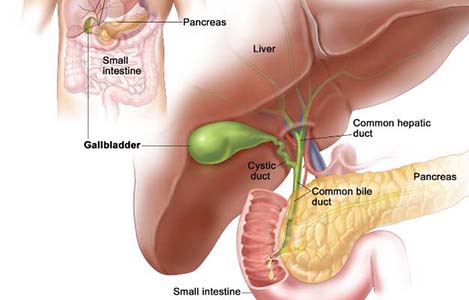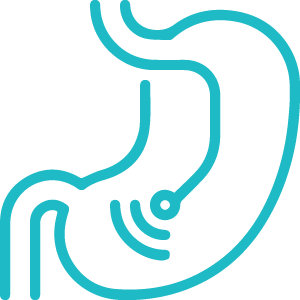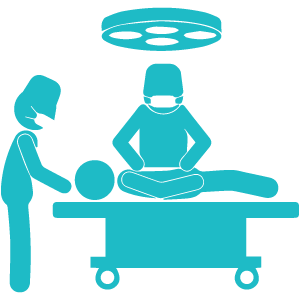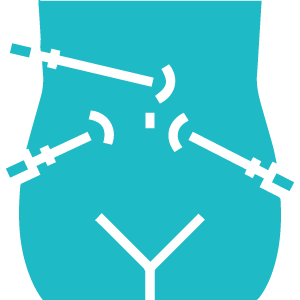
Are you suffering
from Gallbladder Disorder?
Don't ignore your symptoms and get immediate medical attention Today !!
Book an Appointment
Home » Surgery » Laparoscopic Surgery » Gallbladder
What is Gallbladder?
It is a small, pear-shaped organ situated on the upper right abdomen that stores bile made by the liver. The gallbladder releases this bile to help break down and digest fatty foods. Gallbladder surgery, or cholecystectomy, is performed when gallstones get deposited, causing severe pain in your abdomen.
Gallstone Removal Surgery
Surgery is typically not necessary if you are experiencing no symptoms from your gallstones. If you have gallstones, your stomach will experience a severe, knife-like agony that can continue for several hours. When a gallstone enters or obstructs a bile duct, you may require gallbladder or gallstone removal surgery.

Causes & Symptoms of Gallstones
As compared to men, women are more likely to get gallstones. Additionally, those who are overweight and have a family history of gallstones are more likely to develop them. Excess cholesterol in the bile juice is the leading cause of gallstones, which may occur due to obesity or diabetes.
Normally, the bile released by the gallbladder is sufficient to break down the cholesterol your liver excretes. However, if your liver excretes more cholesterol than your bile can break down, it may crystallise and eventually turn into gallstones. Gallstones can also be formed if the bile contains too much bilirubin. The bilirubin chemical is produced by the liver due to red blood cell breakdown, liver cirrhosis, and certain blood disorders.
Symptoms
- Severe pain in the upper right abdomen
- Nausea and vomiting
- Fever and shivering
- Jaundice
- Indigestion and burping

Treatment for Gallstone Diseases
Medications

The gallbladder cannot be cured using medicines. Doctors usually provide some medicines that may slow the growth of the stones but cannot dissolve them. A doctor uses this treatment only in special conditions, like if you have a serious medical condition and surgery can be critical for you or you are waiting, say, a month before surgery.
ERCP (Endoscopic Retrograde Cholangiopancreatography)

ERCP treatment does not remove the gallbladder; it only removes gallstones from the bile duct. This procedure uses a long, thin, flexible tube called an endoscope, which is passed through the mouth and goes down where the bile duct opens in the small intestine.
Open Surgery

Open surgery is rarely performed, only if the gallbladder is cancerous or laparoscopic surgery fails. In this treatment, a 10 cm cut is made underneath the ribs, and the surgeon performs the surgery in traditional procedure with their surgical tools. Removal of the gallbladder through surgery is highly suggested by doctors as it provides a permanent solution to the infection.
Laparoscopic Surgery (Cholecystectomy)

Laparoscopic surgery is the most recommended treatment for gallbladder surgery. It is usually performed under general anaesthesia to avoid pain during surgery. Two small (5 mm) and one large (10 mm) insertions are made in your abdomen, and then the abdomen is inflated using carbon dioxide to make the procedure easier. In one cut, a laparoscope is inserted, which has a tiny light and video camera at the end. Your surgeon performs the procedure while watching a video screen. The gallbladder will subsequently be removed by your surgeon using specialised surgical tools.
Advantages
- You may go home the day after surgery
- Fast recovery
- Fewer scars
- Less pain
- Lower risk of bleeding and infection
Challenges
- Damage to other organs
- Injury and bleeding
- Bile leak
- CO2 gas may create discomfort
- Disturbed bowel movement
Cost of Gallbladder Surgery
Generally, the cost of gallbladder surgery in India ranges from Rs. 60,000 to Rs. 1,50,000. However, the cost may vary according to the gallstone and the treatment required.
Gallbladder Surgery By Dr. Sunil Tibrewal
Dr. Sunil Tibrewal is the perfect surgeon to treat problems related to the gallbladder. He is one of the most highly experienced laparoscopic surgeons, having performed these advanced surgeries for more than 15 years using high-quality treatment and the latest technology.
Contact us to know more about laparoscopic gallbladder surgery, the surgeries we provide, our specialties, and many more options. We are renowned for offering our patients exceptional value. We assist you at every stage and take into account all the nuances of medical procedures.
Reviews & Feedbacks
Comments from people treated by Dr. Sunil Tibrewal for Gallbladder related surgery.

Ayush Saraogi
 "I had a very good experience with Dr. Tibrewal, his way of dealing with the patients is commendable. Thank you for your service.
- on behalf of Sushil kumar Saraogi"
"I had a very good experience with Dr. Tibrewal, his way of dealing with the patients is commendable. Thank you for your service.
- on behalf of Sushil kumar Saraogi"

Manasi Misra
 It is a nice experience having treatment under Dr. Sunil Tibrewal. The Doctor is a kind hearted person.He has done a very successful surgery of mine.After the surgery my recovery is also very fast under the Doctor's treatment.
It is a nice experience having treatment under Dr. Sunil Tibrewal. The Doctor is a kind hearted person.He has done a very successful surgery of mine.After the surgery my recovery is also very fast under the Doctor's treatment.

Sumit Sultania
 Great doctor, soft and gentle behaviour, polite and gentle in nature.
Great doctor, soft and gentle behaviour, polite and gentle in nature.

Ravindra Kumar Yadav
 He is very nice Dr. Very thankful to you sir
He is very nice Dr. Very thankful to you sir

Shana Parveen
 Excellent doctor
Excellent doctor

Abhishek Agarwal
 He had treated my mother. Had a very good treatment from him. Very calm & composed person. The treatment done by him was accurate
He had treated my mother. Had a very good treatment from him. Very calm & composed person. The treatment done by him was accurate
Why Choose Dr. Sunil
Senior Surgeon
Dr. Sunil Tibrewal (MBBS, MS, DMB, MRCH, MNAMS, FIAGES) is a qualified specialist with 15+ years of surgical experience.
Advanced Technology
Dr. Sunil Tibrewal uses modern & cutting-edge medical technologies to provide high quality healthcare services.
Complete Care
Dr. Sunil Tibrewal provides assistance and care at every step in your surgical journey i.e., from consultation to cure
Make an Appointment
Frequently Asked Questions
How long does laparoscopic gallbladder surgery take?
As compared to all treatments, laparoscopy takes the least time. Normally, the whole surgery procedure takes one or two hours. Some people manage to go home on the same day of the surgery if it is done early in the morning.
What should I do before gallbladder surgery?
Eat and drink nothing for 6 hours before surgery, and stop taking certain medications as suggested by your doctor. Complete your medical evaluation as recommended by the doctor, such as blood tests, x-rays, and ultrasounds.
How much time does it take to recover from laparoscopic gallbladder surgery?
Normally, it takes one week to fully recover from laparoscopy. It also depends on the severity of the patient, as everybody has a different recovery period.
What are the side effects and complications of gallbladder surgery?
The surgery may carry some risk of bleeding, abdominal swelling, bile leakage, and infection. It may disturb the bowel movement for some days after surgery.
